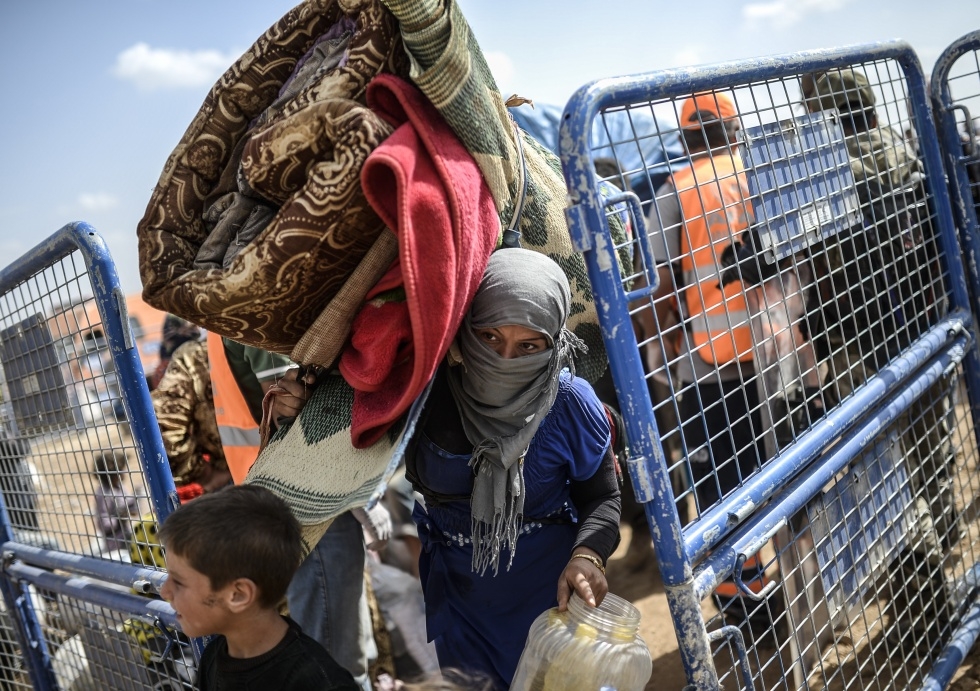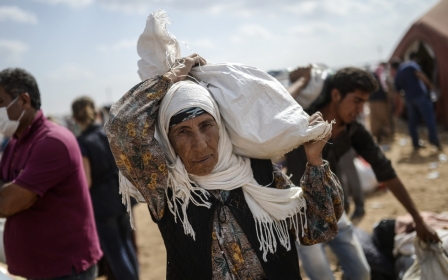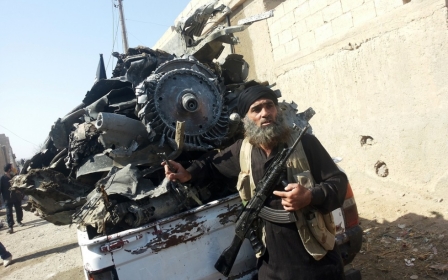Al-Qaeda vows retaliation against West for IS strikes

The al-Nusra Front, al-Qaeda's Syrian franchise, has threatened reprisals against nations participating in air strikes against the Islamic State group, denouncing them as "a war against Islam."
Group spokesman Abu Firas al-Suri said in a video posted online Saturday the states involved had "committed a horrible act that is going to put them on the list of jihadist targets throughout the world."
While IS was initially allied with al-Nusra, the two groups began clashing frequently earlier this year although there have been signs that the two may now be moving closer together.
The al-Nusra warning came as the US-led coalition widened its air strikes against the IS group in Syria, as British warplanes flew their first anti-IS combat missions over neighbouring Iraq.
Washington has been supported in its Syria campaign by Arab allies Bahrain, Jordan, Qatar, Saudi Arabia and the United Arab Emirates.
Seven targets were hit overnight in Syria, the Pentagon said, including at the border crossing into Turkey of the besieged Kurdish town of Ain al-Arab, also known as Kobane.
The US-led coalition also destroyed three makeshift oil refineries in Islamic State-controlled territory in Syria early on Sunday as it pressed efforts to deny the militants a key source of funding, a monitoring group said.
The coalition strikes hit close by the Turkish frontier, near the town of Tal Abyad just across the border fence from the Turkish town of Akcakale, the Syrian Observatory for Human Rights said.
They came after at least a dozen strikes on Thursday night on the refinery infrastructure that the militants have developed in the swathe of territory they control in eastern Syria, which includes many of the country's main oil fields.
"At least three makeshift refineries under IS control in the Tal Abyad region were destroyed overnight," the Observatory said.
"IS had been refining crude and selling it to Turkish buyers," said the Britain-based watchdog, which has a broad network of sources inside Syria.
Before the launch of US-led air strikes on IS in Syria, analysts estimated that IS was earning as much as $3 mn a day from oil revenues.
The strikes around Tal Abyad came after Saturday raids on the mainly Kurdish town of Ain al-Arab, also very close to the Turkish border.
The town, known as Kobane in Kurdish, has been under assault by IS for more than a week, sparking an exodus of at least 160,000 refugees into Turkey.
The coalition also kept up its raids on the Islamic State heartland province of Raqqa early Sunday as it pressed what Washington says are "near continuous" strikes.
The raids destroyed a plastics factory outside Raqqa city, killing one civilian, the Observatory said.
Muhsin al-Fadhli, a long-standing Qaeda operative and alleged leader of linked group Khorasan, was also reportedly killed in the strikes, according to a militant who fought with the group.
The SITE monitoring group said a series of tweets from militant-linked accounts identified as a member of Al-Qaeda, expressed condolences for the deaths of Fadhli and another Khorasan leader, Abu Yusuf al-Turki.
The US-based monitoring service said the comments posted on Twitter were dated 27 September 2014, also lamented the situation on the ground in Syria as coalition forces bombard IS forces.
After two months of hesitation, British fighter planes finally arrived in the region on Saturday in preparation for expected strike action.
Royal Air Force Tornado GR4 jets took off from Britain's RAF Akrotiri on Cyprus for Iraq but returned to base without dropping their laser-guided bombs.
"On this occasion no targets were identified as requiring immediate air attack by our aircraft," said a defence ministry spokesman in London.
Belgium and Denmark have also approved plans to join France and the Netherlands in targeting IS in Iraq, allowing Washington to focus on the more complex operation against its Syria base.
Washington warned that the jihadists could not be defeated in Syria by air power alone, saying that up to 15,000 "moderate" rebels would need to be trained.
Turkey mulls 'necessary steps'
Turkish President Recep Tayyip Erdogan may also soon join the coalition, pledging that Turkey would take "all the necessary steps" to beat back Islamic State.
The Turkish parliament is now expected to vote on military action on 2 October, although it is as yet unclear whether Turkish support will be more logistical, or whether it too will join in the US-led bombing campaign.
Ankara had previously insisted its hands were tied over dozens of Turkish hostages abducted by IS in Iraq, but they are now free.
Hundreds of Syrian Kurdish refugees, clutching whatever they could grab, crossed the border Saturday to safety.
Turkey's NTV television reported that shells fired from Syria hit Suruc, a Turkish border town, about 10 kilometres north of Syria, wounding two women.
New MEE newsletter: Jerusalem Dispatch
Sign up to get the latest insights and analysis on Israel-Palestine, alongside Turkey Unpacked and other MEE newsletters
Middle East Eye delivers independent and unrivalled coverage and analysis of the Middle East, North Africa and beyond. To learn more about republishing this content and the associated fees, please fill out this form. More about MEE can be found here.



